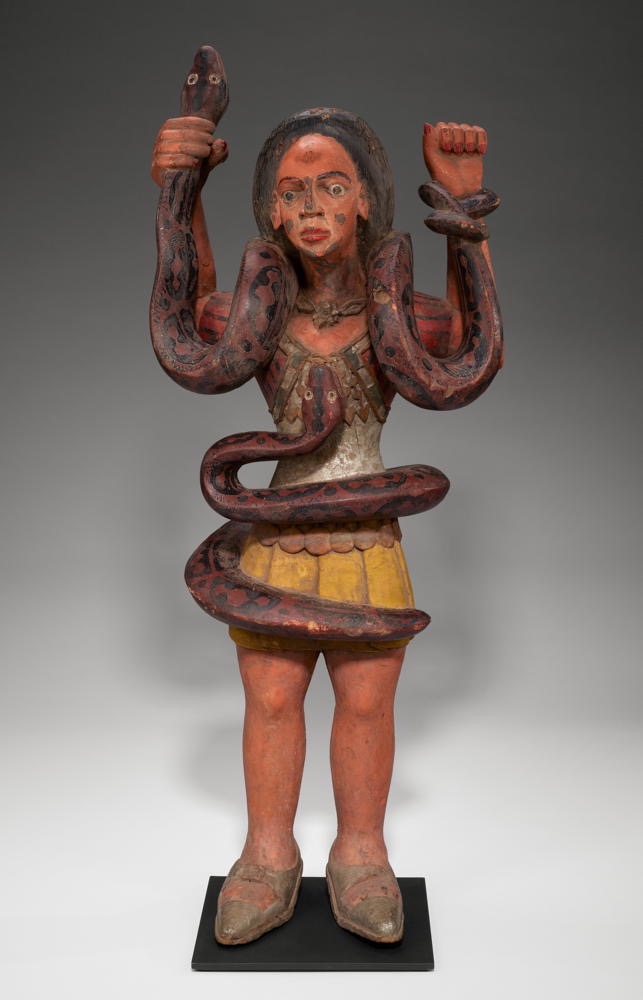CashEconomy

Unknown Igbo Artist: Mami Wata figure (1950s)
"I might have been broke, but never broken."
The bankruptcy rendered us effectively insolvent. We entered a previously unperceived CashEconomy. It was as if the economy had suddenly returned to the gold standard, and we had no access to gold. Modern economies do not trouble themselves very much with cash. It serves more as an artifact than as a means of exchange. It becomes a metaphor, a way of speaking about value rather than a means for holding it. Modern economies transact exchanges with symbols once or more times removed from actual specie, just as CashEconomies sit at least once removed from their underlying gold. It's enough that Fort Knox holds reserves. Remember, it became illegal for private citizens to hold too much gold, even when we were still on the so-called gold standard. Such conventions ultimately came to limit economic potential, and so were done away with in favor of plastic and similar, more imaginative systems.
The most profound initial effect of the bankruptcy was a radical loss of liquidity. I was suddenly worth precisely whatever cash I had on hand. I'd bartered away access to credit in return for debt forgiveness, so I would be unworthy of the routine trust extended to everyone still holding plastic. It was as if we'd been sent back to the early 1930s when pork chops only cost a nickel, but nobody had a nickel. We learned to make do. Some people offered us dinners. One who owned a pond invited me to fish it. When I described our rapid descent into cash in my White Collar Recession series in the local newspaper, I received several generous offers and grateful notes thanking me for describing what they were going through. There was always a CashEconomy seething beneath the more obvious one. Those who pay with cash have become like those who insist upon writing a personal check at the supermarket, an encumbrance to transactional navigation.
When the Exile came, we found ourselves too cash-poor even to effect an escape. We felt forced to humiliate ourselves and borrow cash from my elderly parents so that we could travel to the far side of the country to begin our recovery. We slinked out of town. We arrived no better off than we'd left. Entering The Swamp, we found an even more modern economy than we'd left, where cash had been disposed of as royalty eons before. We were at a distinct disadvantage. We coped by simply refusing to buy anything but transportation and groceries. The Metro passes were necessary excesses, as was gasoline. The grocery expenses, too, couldn't be realistically avoided. That first year in exile, I purchased precisely two shirts off a sales rack and a single hat I felt necessary to survive the tropical sun.
When we finally found a house to rent, The Muse immediately admitted what had happened, that we were recovering from a recent bankruptcy and currently inhabiting a cash economy. The prospective landlords didn't have to accept us as worthy of a lease, but they did at their neighbor's insistence. We were never tardy with any payment. We excruciatingly slowly weaseled our way back into our more modern alternate economy, though we took away some lessons we'll likely never forget. Like my parents, who survived The Great Depression, our experience inhabiting the CashEconomy left lasting impressions. I remain hesitant to buy anything but groceries and gas. Everything else seems optional or eminently deferrable. I maintain a wardrobe less than a fifth the size of The Muse's and have only recently consented to upgrade that so that I might accompany her on official business. My experiences living in the CashEconomy rendered me a skinflint.
Some say that abundance is a mindset. Set your mind on prosperity, and it will certainly find you. This philosophy seems like basic bullshit, for I've lived on the far side of it. I learned there that conventional prosperity probably doesn't matter. I classify my address and the number of cars I possess as mammon, not without value but capable of weighing down my spirit. The CashEconomy taught me to be careful, to know how much cash my pocket holds and to avoid aspiring to stuff I can't afford.Consequently, I do not collect toys or tokens. The person accumulating the most toys seems to have missed some critically crucial point. I write for a living because it costs me nothing. The result doesn't attract me wealth, either, but instead of inhabiting a CashEconomy, I came to see the possibilities a creative economy offers. When Exiled, I withdrew from actively engaging in economic activity. The Muse earned the paycheck and still does. I engage almost exclusively in economically worthless activities. The CashEconomy taught me the underlying absurdity in all economic activity. It broke me, thank heavens. I might have been broke, but never broken. I exited much more circumspect than I'd entered.
©2024 by David A. Schmaltz - all rights reserved


